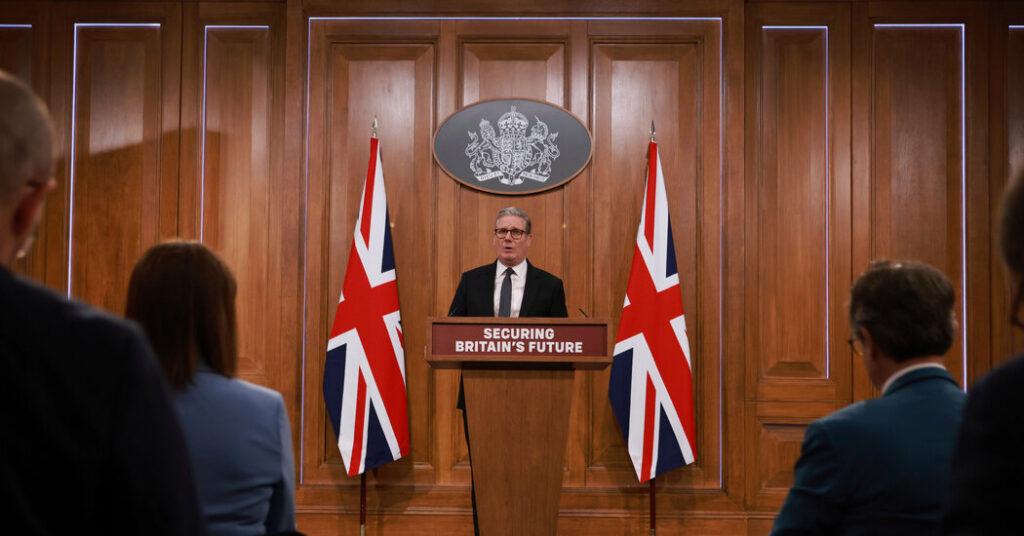Britain’s government on Monday promised to tighten migration rules and make it harder for newcomers to permanently stay in the country, in a sign of the increasing political pressure on Prime Minister Keir Starmer to cut immigration numbers.
Under the plans, visas for some lower skilled workers would be reduced, language requirements for immigrants raised and the length of time needed for most newcomers to qualify for citizenship or the right to stay permanently would double, from five years to 10.
In a speech from Downing Street, Mr. Starmer, who leads the governing Labour Party, accused his predecessors of allowing immigration to run out of control and effectively creating an experiment with open borders.
“Today this Labour government is shutting down the lab. The experiment is over. We are taking back control of our borders,” he said, adopting the slogan used by pro-Brexit campaigners ahead of Britain’s referendum on leaving the European Union in 2016.
Without his new measures, Mr. Starmer added, “we risk becoming an island of strangers, not a nation that walks forward together.”
The measures announced on Monday relate only to legal immigration. Previous Conservative leaders promised to cut immigration to specific targets, beginning with Prime Minister David Cameron, who notoriously pledged to get net migration down from hundreds of thousands a year to the “tens of thousands,” a policy that he never delivered on and which became a political liability for his party.
Partly as a result of that, Mr. Starmer’s plan includes no concrete targets for the number of legal immigrants who will be allowed each year, instead opting for a broad pledge.
“Make no mistake, this plan means migration will fall, that’s a promise,” Mr. Starmer said from Downing Street, adding that if ministers need to take further steps to release pressure on housing and public services, then “mark my words, we will.”
The crackdown contains some risks for the government at a time when the economy is flatlining, cracks are visible in the care system for older people, and some employers are complaining about labor shortages. But Mr. Starmer rejected the argument that large-scale immigration by definition promoted economic growth.
His hardening stance reflects how migration is once again a hot-button issue in Britain. Earlier this month, Nigel Farage, leader of the anti-immigration Reform U.K. party, won a significant victory in regional and mayoral elections — marking a big setback for Mr. Starmer’s Labour Party and the opposition Conservatives.
Senior government ministers have speculated that Reform may emerge as Labour’s main rival by the next general election, which might explain a blunt new tone from Mr. Starmer who wrote on social media: “If you want to live in the U.K., you should speak English. That’s common sense.”
But some critics argue that the approach could validate Mr. Farage’s right-wing populist agenda and fuel prejudice. “The step-up in anti-migrant rhetoric from the government is shameful and dangerous,” wrote Nadia Whittome, a Labour lawmaker, on social media.
Sunder Katwala, the director of British Future, a research institute that specializes in migration and integration, said the government needed to show it was able to manage immigration, but questioned Mr. Starmer’s language. “I think they should be doing this, with lots of this kind of content,” he said, “but with a more balanced tone.”
Responding to the announcement that work visas for care workers would end, Martin Green, chief executive of Care England, which represents providers, said was “a crushing blow to an already fragile sector,” and that the government was “kicking us while we’re already down.”
Universities U.K., which represents higher education colleges, called on ministers to “think carefully” about the impact of a planned new levy on international student fees.
Immigration was a big theme in the run-up to the 2016 referendum, in which 52 percent of Britons voted for Brexit. Some of the biggest advocates for Brexit, including Boris Johnson and Mr. Farage, promised to “take back control” of migration policy if Britain quit the European Union.
But after Brexit, under Mr. Johnson’s leadership as prime minister, annual net migration tripled, peaking at more than 900,000 in the year ending June 2023.
At the same time, arrivals of asylum seekers from France on small, often unseaworthy boats increased and Mr. Farage has capitalized on both issues.
Mr. Starmer’s critics on the right argue that he is not going far enough and note that, because of restrictions outlined by the last government toward the end of its time in power, numbers are expected to fall anyway. Reform U.K. wants to freeze what it calls “nonessential immigration,” although it has not explained what this would mean in practice. The Conservatives are calling for a binding annual ceiling.
But the Conservatives, who were ejected from power last year after 14 years, have a difficult record to defend. Successive Conservative governments promised to cut net immigration to less than 100,000 a year but ended up presiding over net migration numbers nine times that level.



